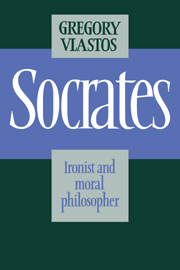Book contents
- Frontmatter
- Contents
- List of additional notes
- Introduction
- 1 Socratic irony
- 2 Socrates contra Socrates in Plato
- 3 The evidence of Aristotle and Xenophon
- 4 Elenchus and mathematics
- 5 Does Socrates cheat?
- 6 Socratic piety
- 7 Socrates' rejection of retaliation
- 8 Happiness and virtue in Socrates' moral theory
- Epilogue: Felix Socrates
- Additional notes
- Bibliography
- Index of passages cited
- Index of names in Plato and Xenophon
- Index of modern scholars
- Index of Greek words
5 - Does Socrates cheat?
Published online by Cambridge University Press: 21 October 2009
- Frontmatter
- Contents
- List of additional notes
- Introduction
- 1 Socratic irony
- 2 Socrates contra Socrates in Plato
- 3 The evidence of Aristotle and Xenophon
- 4 Elenchus and mathematics
- 5 Does Socrates cheat?
- 6 Socratic piety
- 7 Socrates' rejection of retaliation
- 8 Happiness and virtue in Socrates' moral theory
- Epilogue: Felix Socrates
- Additional notes
- Bibliography
- Index of passages cited
- Index of names in Plato and Xenophon
- Index of modern scholars
- Index of Greek words
Summary
That Socrates does not scruple to palm off on his interlocutors – for their own good, of course – premises he considers false or inferences he knows are crooked has been maintained repeatedly by scholars of high repute. E. R. Dodds: “It looks rather as if Plato was content at this stage to let Socrates repay the Sophists in their own coin, as no doubt Socrates often did.” Paul Friedländer: Socrates believes that to educate deluded persons “he must resort to dialectical tricks”; and he “knows how to deceive better than all the sophists.” W. K. C. Guthrie: “Plato lets Socrates make a wickedly sophistical use of ambiguity when he likes.” Charles Kahn: Socrates uses “dialectical trickery” to win his argument against Polus in G. 474c–475c.
I am not suggesting that such views are now shared by a majority of Platonic scholars. My distinct impression is that quite the contrary is the case. Thus two of the best of recent philosophical commentaries on Socratic dialogues, C. C. W. Taylor's on the Protagoras (1976) and T. H. Irwin's on the Gorgias (1979), give no quarter to the idea that Socrates resorts to sophistry when it suits his purpose. Neither does the systematic examination – the most comprehensive on record – of the arguments in Plato's earlier dialogues in Gerasimos Santas' Socrates (1979).
- Type
- Chapter
- Information
- SocratesIronist and Moral Philosopher, pp. 132 - 156Publisher: Cambridge University PressPrint publication year: 1991

